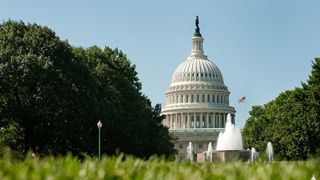No Save the Internet Vote Tuesday

Following debate and votes on a handful of amendments, the House has postponed further action on the Save the Internet Act until Wednesday at 9 a.m. That bill would restore net neutrality rules under Title II authority.
Following a vote on six of a dozen amendments, the debate gave way to one-minute speeches on unrelated issues, then longer speeches. A committee source confirmed that no more action on the bill would be taken until Wednesday.
One amendment that was accepted unanimously calls for a GAO study of "all entities on the virtuous cycle of the internet ecosystem and whether such rules protect the access of consumers to a free and open internet." That would include Facebook, Google and YouTube. Doyle said he agreed there were problems on the edge, and while the bill was on a different subject, Democrats would work with Republicans on the issue.
Related: Bennett: Save the Internet Act Has It All Wrong
The amendment-related bipartisanship notwithstanding, House Republicans have said flatly the bill will not pass the Senate, which their colleagues control, so if they are going to study the edge, it will likely have to come via some other vehicle.
Amendments that did not even make it to the floor because they were not ruled to be in order by the Rules Committee included:
1) "Prohibits, explicitly and statutorily, the Federal Communications Commission from regulating the rates charged for broadband internet service";
Broadcasting & Cable Newsletter
The smarter way to stay on top of broadcasting and cable industry. Sign up below
2) "Says that H.R. 1644 will not apply to 5G";
3) "Ensures that the FCC's Title II authority over "telecommunication services" to raise fees, moderate content, and seize and control networks will be negated";
4) "Creates an exemption from transparency requirements for internet service providers with 250,000 subscribers or less for five years";
5) "Initiates a review of the challenges for Rural Broadband providers in serving hard-to-reach areas";
6) "Prioritizes federal funds under the Farm and Rural Development Act that are used to provide broadband access to areas that are unserved with no access, before they are used to upgrade areas with existing service."
Contributing editor John Eggerton has been an editor and/or writer on media regulation, legislation and policy for over four decades, including covering the FCC, FTC, Congress, the major media trade associations, and the federal courts. In addition to Multichannel News and Broadcasting + Cable, his work has appeared in Radio World, TV Technology, TV Fax, This Week in Consumer Electronics, Variety and the Encyclopedia Britannica.

